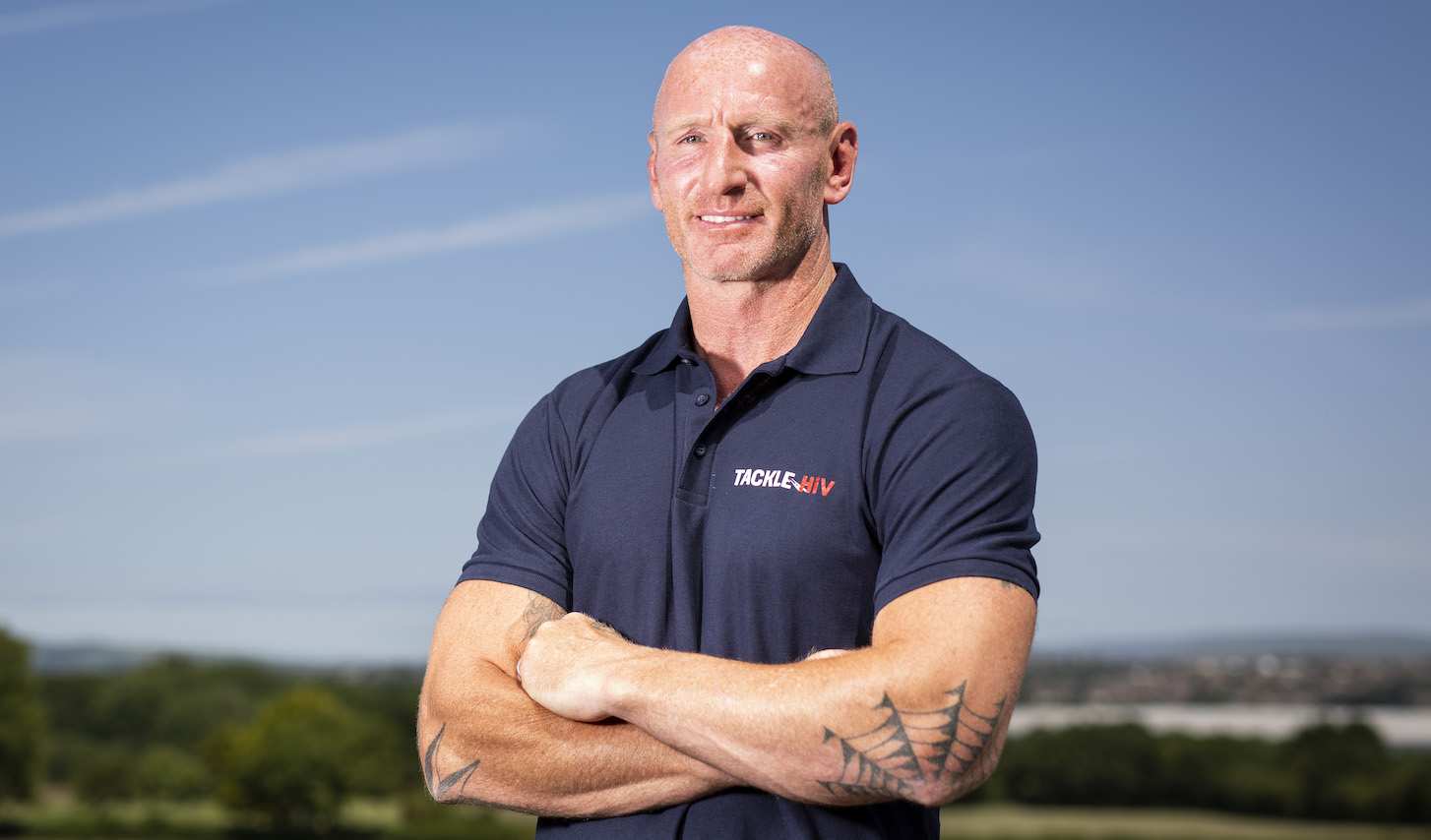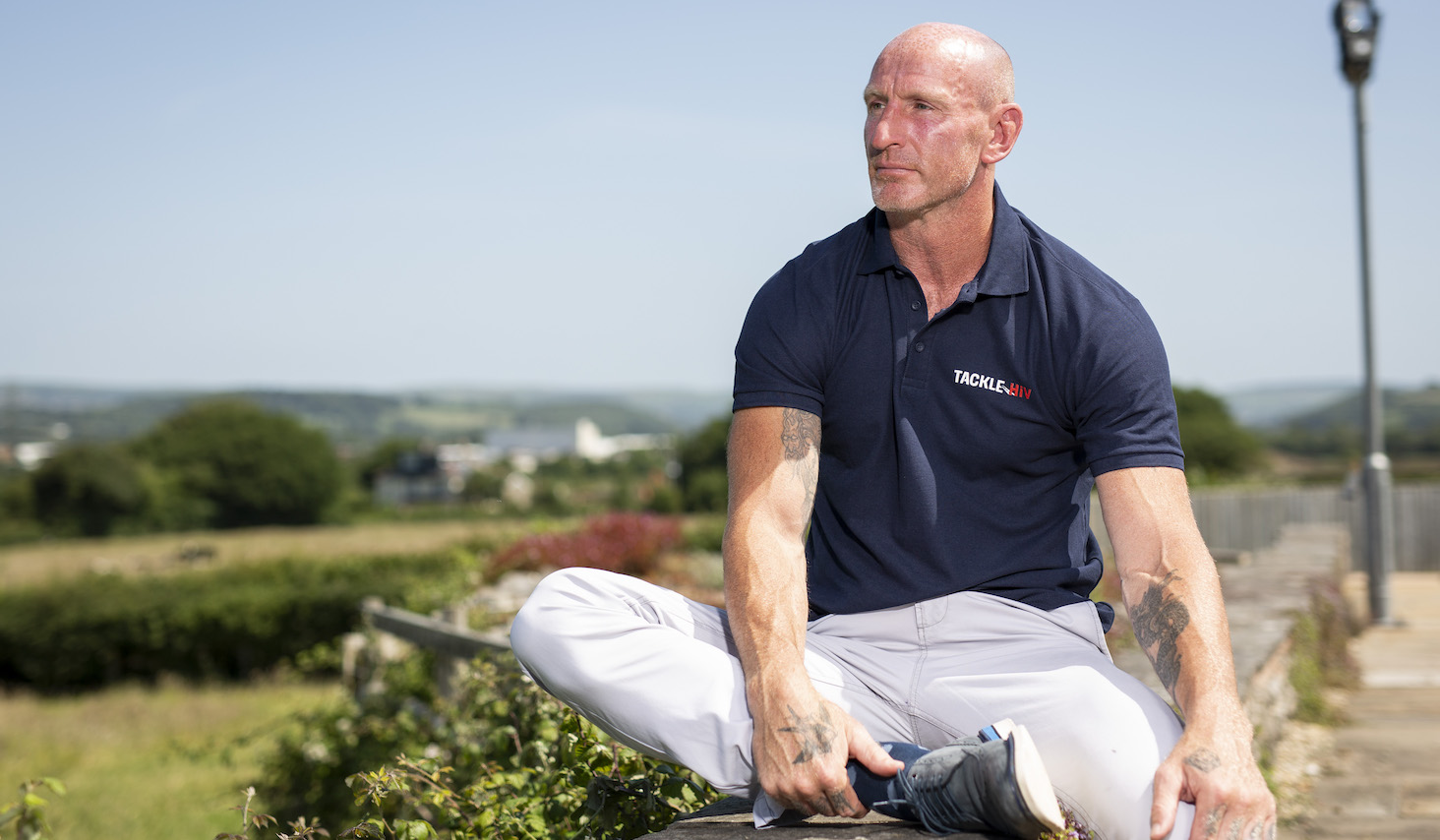
Following his public admission of living with HIV in September 2019, Gareth Thomas has fervently used his platform to shatter misconceptions and debunk harmful myths about the condition. Earlier this year, the former professional rugby player collaborated with ViiV Healthcare and the Terrence Higgins Trust to launch the Tackle HIV campaign, a brand new initiative aimed at improving levels of public understanding of HIV.
Thanks to advances in science and medicine, HIV is now a manageable chronic condition, and those who are on effective treatment have an undetectable viral load, which means they cannot pass the virus on. Despite this, results of the recent Tackle Survey demonstrated the amount of misunderstanding and stigma that continues to exist, with 61% of those surveyed admitting that if their partner was HIV positive, they “would or might” end the relationship. 17% also said they would be embarrassed if someone found out their partner had HIV. For Gareth, the survey justified the legitimacy of the campaign.
“It feels like over the last 20 years or so, medicine and science has been this underground movement of success, but it’s never really been celebrated or publicised of how advanced it’s become, so people just don’t know,” he tells GAY TIMES over the phone. “People are really wary of those living with HIV, being in the same room and having a relationship with somebody with HIV. If it was any other form of illness that’s become advanced in medicine, then it’d be celebrated.”
We spoke with Gareth about the origins of the Tackle HIV campaign, whether press coverage on the subject has improved in recent years and how the coronavirus pandemic has disproportionately impacted those living with HIV.
Why did you start the Tackle HIV campaign?
When I first got diagnosed with HIV, I thought I was going to die, not realising that there was any other other option for me. That was a version of self-stigma, a stigma that had been created maybe 20 or 30 years ago from thinking I knew everything about HIV. There was that tombstone advert, on top of what everyone was saying and doing during the 80s and 90s. When I started the conversation, certainly when I spoke about it, I realised that it was a difficult conversation for some people to have. I wanted it to stop being a difficult conversation. Twelve months ago, I didn’t want it to be a headline and have people stop talking about it after a few days. I wanted it to continue because stigma and misunderstanding around HIV continues. The only way to break it is to educate people. From the numbers that we did in surveys, we realised that I wasn’t a version of self stigma because I lived a sheltered life, it was because so many people thought they understood what HIV was. They thought that it was a virus that could be added or transmitted through a hug, drinking from the same glass, or any other mythical form. I wanted to find the platform and use that platform to break that misunderstanding. It’s important to give people the facts on what it is to live with HIV in 2020. I take a single tablet every day, which means I suppress my viral load, which means that I’m not at risk of transmitting the virus to anybody. I have a husband who is HIV negative and we have a very active life. I want people to know this.
61% of people surveyed said if they found out a potential partner was HIV they would or might end the relationship – why do you think that number is still so high in 2020?
Because people don’t understand the facts about HIV. People feel like they’re educated, so it’s difficult trying to say to people, ‘What you thought you knew, stop thinking that.’ It feels like over the last 20 years or so, medicine and science has been this underground movement of success, but it’s never really been celebrated or publicised of how advanced it’s become, so people just don’t know. People are really wary of people who live with HIV, being in the same room and having a relationship with somebody with HIV. If it was any other form of illness that’s become advanced in medicine, then it’d be celebrated. HIV is a subject that has never really been spoken about in a positive way, so people are sheltered away from the truth. When you hear what somebody else says, or you remember what somebody’s mum and dad told you or your grandkids told you, that becomes your thought process about people living with HIV. That is it. For me, the facts of the survey did scare me, but it did also justify the reason as to why I am trying to move forward and educate people to break the stigma around HIV.

Do you think press coverage on the subject of HIV has improved is there still a wide misunderstanding in certain areas of the media?
It’s interesting, because I was talking about that today and the campaign. We’ve really targeted media, and I’ve never seen so much positive press around HIV. So I think potentially there has been, because there’s been such a misunderstanding. When I did the first campaign, a lot of reporters were stuttering in their questions. They weren’t very confident in what they were asking because we were on a subject that reporters didn’t really know anything about. They were kind of trying to compute the fact that if somebody is undetectable, it’s untransmittable. They didn’t quite get it. It only takes somebody to shine a light on the problem to see it. I think we need to shine a light on the problem, but also shine a light on the solution, and give people a solution. When you shine light on the problem without the solution, then people just see it as a problem. But the problem is, people are not seeing the solution, that people living with HIV in 2020, if they’re on effective treatment, there is no risk. It’s not like it was in the 80s. It’s changed, but we need to shine the light on the solution as well as the problem. That’s the only way we’re going to move forward as a society.
Do you think the UK currently provides adequate mental health services for those living with HIV?
I think there’s services out there. Obviously one of the main ones is tacklehiv.org, but I feel like you could always have more. It’s all about giving the people the information. They shouldn’t feel like I did, like so many other people still do. You shouldn’t feel like you have a mental health issue living with HIV, because I want to create an environment where people are not afraid to say they’re HIV positive, where they’re not afraid to say they’re going for a HIV test, whether it be from positive or negative, because we’ve created an environment that’s already accepting of it. I want to change the environment now, for the people who have been in environments where they keep it a secret and it therefore harbours on their brain. I want to create an environment that people actually feel that they could go into and not be stigmatised, not be misunderstood, so there is no fear around living with HIV for them anymore. My thing is to create this so there are no mental health issues.
How do you think the pandemic has impacted those living with HIV?
People, for all different kinds of ailments, are not going to the hospital. It scares me to think that people who are potentially at risk of transmitting HIV are not going to the hospital to get a test, therefore they could be so far down the line of living with HIV that it impacts them for the rest of their life, or they will have some kind of disability. So yeah, it is a huge issue, but that issue also comes with all other viruses or illnesses that that are potentially out there. I think HIV is just another added one to talk about. I people realise through coronavirus is the fact that, whether you’ve had coronavirus, whether you have coronavirus, whether you’re high risk, whether you’re low risk, whether you’re young, whether you’re old, we all have to understand it to be able to live together. That’s why more people will learn that with HIV, that we all have to understand it because they have the same categories. Whether you’re young, you’re old, you’re high risk, low risk, male, female, Black, white, gay, lesbian, straight, bisexual, transgender, whatever it may be. We all have to learn about HIV to be able to all live together in a good society. That’s what I hope people get out of this.
Do you share people’s frustrations around COVID being seen as the biggest epidemic in 100 years and the whole HIV/AIDS crisis being ignored in that narrative?
I haven’t turned the news on since April, because as somebody living with HIV, there’s words out there that scare the shit out of me. I don’t like to hear the word ‘disease’. If someone says the word to me, I get petrified because when I was stigmatised myself, I thought HIV was a disease and a deadly disease. When I turned the telly on in March, trying to figure out what was going on, someone people called it a virus or a deadly disease. So for me, I think there’s this element of fear through a lot of news outlets, that people have decided to use to create the world’s worst pandemic. They want to create it as that, rather than putting it into comparison to some other viruses or some other ailments such as HIV, which may have been worse pandemics. But to them right now, as far as so many people are concerned, they want to create this as the worst one. They’re doing what they can to scare the living shit out of people.
Russell T. Davies’ new series It’s a Sin tackles the HIV/AIDS crisis in the 80s – how important is it for mainstream media to keep educating audiences about HIV?
I think any form of media, any outlet that beams a message into a living room, that starts a conversation, is important. There could be that very stereotypical family of a mother, father, baby and two children who would never have that conversation unless that topic was raised by a television programme, giving people the ability to ask questions. I think anything, whether it be through print or television, that is almost sometimes uncomfortable, because we’ve never seen it before, I only applaud. I feel that’s the way we start conversations. The more conversations we have, the more people learn and the better society gets.
PrEP has just been made available in England – do you feel like there should be more visible messaging around its availability?
100%. It saves the NHS because people will be sensible and not put themselves at risk of contracting HIV, which is something they live with for the rest of their lives. I’m also a part of a select committee, which is trying to making England the first country in the world that has zero new HIV transmissions in 10 years. We’ve been able to have it in Wales, but in England, there’s some great cities which are very open and diverse with big LGBT communities. PrEP being rolled out in England will only help us reach our target of zero new HIV transmissions.
For more information about the Tackle HIV campaign, visit their website.
